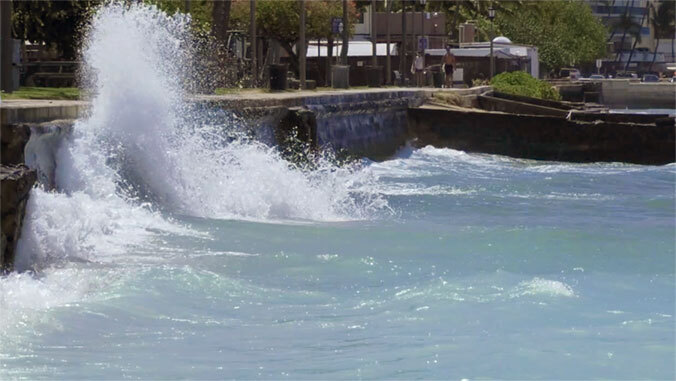
Due to its remote geographic location and extensive coastlines, the State of Hawaiʻi is particularly vulnerable to climate change and sea-level rise. While Hawaiʻi was among the first states to officially recognize the climate crisis and has played a leading role in combating climate change, Hawaiʻi’s lawmakers are still developing plans and policies to address predicted impacts of sea-level rise.
A research team from the University of Hawaiʻi Economic Research Organization (UHERO) surveyed all elected officials in the Hawaiʻi State Legislature and the state’s four county councils between June and September 2023 to better understand how they are grappling with sea-level rise. A total of 32 individuals responded (18 from the state legislature and 14 from the county councils) for a combined response rate of 29%.
The survey results indicate a universal acknowledgment that sea-level rise is happening. A slim majority attribute sea-level rise to a mix of human activities and natural processes, while nearly half believe it is solely due to human activities. Policymakers express serious concern about sea-level rise, foreseeing significant or catastrophic effects in Hawaiʻi over the next 50 years.
Of those who responded, a majority of county council members (64%) feel well informed about sea-level rise and 36% feel moderately informed. By contrast, the majority (61%) of state legislators feel only moderately informed while 39% feel well informed.
Respondents overwhelmingly predict serious impacts on Hawaiʻi, including frequent flooding, erosion, loss of beaches, and damage to properties and infrastructure. Responding lawmakers are equally confident that Hawaiʻi will experience negative socioeconomic impacts, such as damage or loss of coastal properties (100%), increases in insurance premiums (97%), disruption or losses in major tourism/resort areas (88%), loss of important cultural sites and practices (97%) and more. Perhaps most troubling, no respondents find the state well-prepared for the impacts of sea-level rise. Most lawmakers (63%) believe Hawaiʻi is underprepared, while 35% think Hawaiʻi is only somewhat prepared.
Not a top priority
Despite the high level of concern and general agreement that Hawaiʻi is unprepared, sea-level rise is not a top priority among Hawaiʻi’s policymakers. Only 9% of total respondents rank sea-level rise as a top priority, while 44% place it high on their list and 35% place it mid-list.
What adaptation strategies do lawmakers support?
Strong support is evident for nature-based solutions, such as restoring living shorelines and safeguarding critical infrastructure (94% of respondents support both strategies). Regulatory measures, including zoning and setback laws (91% support), also receive considerable backing. Other policy measures that command strong majority support include adopting permitting tools that incentivize removal or relocation of sea-level rise-damaged structures (75% support), while 65% favor creating mandates to remove seawalls where no beach is left, and 60% support using transfer of development rights to enable relocation for coastal owners.
What are the major obstacles to progress?
UHERO’s survey results show that lawmakers are particularly concerned about funding and staff support for the implementation of sea-level rise adaptation strategies, and coordination among county agencies and state government. More specifically, elected officials point to the lack of funding to implement a plan (78%), insufficient coordination among agencies and stakeholders (72%), and the need for more staffing resources to analyze information (34%).
Possible recommendations
- Implement policies that lawmakers already support—Respondents largely agree on revising permitting and building codes to promote resilient construction practices and elevate buildings in vulnerable areas. There is also a broad consensus on enforcing recently updated codes and coastal regulations and on using nature-based solutions, such as restoring and promoting living shorelines.
- Enhance policy coordination—Survey respondents believe limited coordination among agencies and stakeholders is a significant obstacle to addressing sea-level rise. To overcome this obstacle, policymakers could create new comprehensive and collaborative governance structures and strategies to address sea-level rise.
- Address policy knowledge gaps and lack of analytical capacity—Respondents say they need more information about the available policy options and successful responses in other jurisdictions. To close this knowledge gap, experts and researchers should consider how they can better communicate with policymakers about effective policies and how they can be adapted to the needs of Hawaiʻi.
- Prioritize planning and funding for sea-level rise adaptation—Hawaiʻi’s leaders cite a lack of funding for planning and implementation as a significant obstacle to sea-level rise adaptation. Although national political dynamics largely determine federal funding, Hawaiʻi should be prepared to capitalize on significant federal investments, such as the 2022 Inflation Reduction Act. Hawaiʻi’s leaders could also consider new revenue streams for funding large- and small-scale adaptation projects, and work to overhaul state and county procurement systems.
UHERO is housed in UH Mānoa’s College of Social Sciences.

